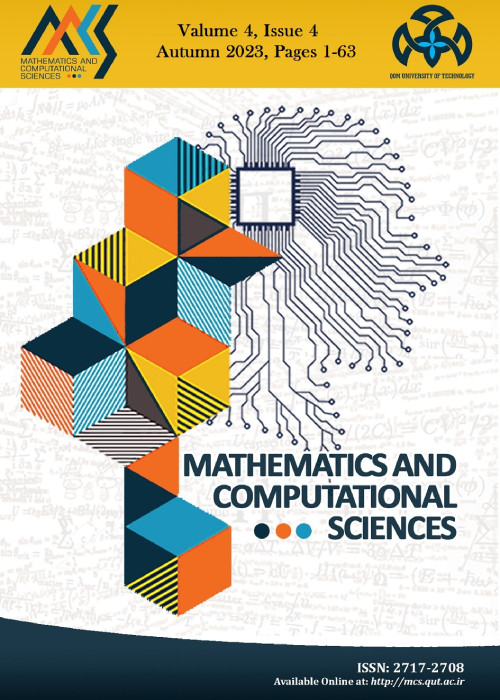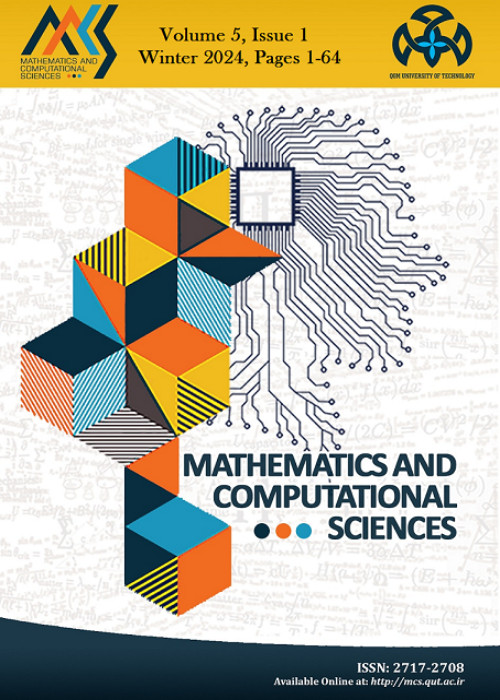فهرست مطالب

Mathematics and Computational Sciences
Volume:4 Issue: 4, Autumn 2023
- تاریخ انتشار: 1402/10/11
- تعداد عناوین: 6
-
-
Pages 1-9In this paper, the notion of limit property (Tayyab kamran, 2004) and some notions and theorems (Tayyab kamran & Calogero Vetro & Muhammad Usman Ali & Mehwish Waheed, 2017) on metric space are generalized for multi-valued function on S-m spaces. We also present an application to nonlinear integral equations.Keywords: G-monotone, Hausdorff S-metric, Integral equations, Limit property, Regular graph
-
Pages 10-16The problem of path detection in graphs has been proposed from the past up to present, and various solutions have been proposed for this purpose, but it is often not an easy task to implement these methods on a computer. In this paper, a technique for detecting paths in a graph will be introduced using matrix algebra, which makes it possible to implement this rule on a computer. This method can be helpful the optimization of tree-spanning trees in networks. At the end of this study, a numerical example is solved using the proposed method.Keywords: Discrete Mathematics, Optimization, Path Design, Graph Theory
-
A numerical method for solving non-linear volterra integro-differential equation of fractional orderPages 17-25In this paper, we develop and implement numerical method for the solution of non-linear Volterra integro-differential equations of fractional order using collocation method. We obtain the integral form of the problem and transform it into system of algebraic equations, we solve the algebraic equations using matrix inversion method. The analysis of the developed method is investigated and solution found to be q-contraction and convergent. The uniqueness of the solution also proven. Numerical examples were considered to test the efficiency of the method which shows that the method compete favourably with the existing methods.Keywords: collocation, Non-linear, Approximate Solution, Fractional Order
-
Pages 26-38Complex fuzzy set was originally proposed as a mathematical tool to deal with uncertainty by taking amplitude term and phase term memberships of an element of a universal set. In this article, we study (α,θ)-cut sets of the complex fuzzy sets and describe some related properties of them. Based on these (α,θ)-cut sets, some decomposition theorems of the complex fuzzy sets are proposed. Moreover, the concept of Zadeh’s extension principle of the fuzzy sets is extended to the complex fuzzy sets and explored various related properties. Finally, some arithmetic operations are demonstrated for the complex fuzzy set by using the extension principle of the complex fuzzy sets. Numerical illustrations for each arithmetic operation are also given.Keywords: Complex fuzzy set, (α, θ)-cut, Arithmetic Operations
-
Pages 39-52The efficiency of the Adomian decomposition method in the solution of integro-differential equations cannot be overemphasized. However, improvement of the method is needed as its drawbacks have been analyzed and reported in recent literature. This present work develops a new modification of the method and its implementation on linear Fredholm type of integro-differential equations. The approach is based on the modification of the traditional Adomian decomposition method. The idea employs the Taylor series expansion of the source term whose resulting functions were combined in two terms for predicting the solution in each iteration. This approach yields a very high accuracy degree when compared to related methods in literature. The newly proposed method is said to accelerates and converges faster than the standard Adomian Decomposition Method. The procedure proves to be concise, effective and converges faster to the true solution of linear Fredholm Integro-differential problems.Keywords: Source term, Adomian decomposition method, Fredholm Integro-differential equations, Taylor series, infinite series
-
Pages 53-63In this article, we investigate Ehrenfest's theorem from the Dirac equation in a noncommutative phase-space where we calculate the time derivative of the position and the kinetic momentum operators for Dirac particles in interaction with electromagnetic field and within a noncommutative setting. This allows examining the effect of the phase-space noncommutativity on Ehrenfest's theorem. Knowing that with both the linear Bopp-Shift and ⋆product, the noncommutativity is inserted.Keywords: Dirac equation, Noncommutative quantum mechanics, Classical limit, Ehrenfest's theorem


